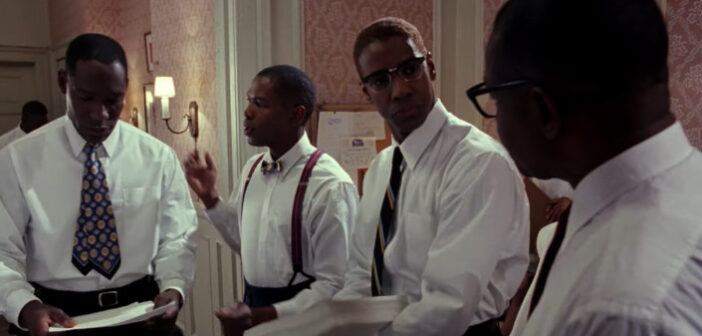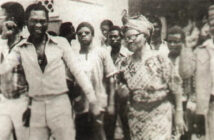Black History Month is not only a time to honor the achievements and contributions of African Americans throughout history but also to celebrate their cultural impact across various mediums, including cinema. From groundbreaking dramas to powerful documentaries, black filmmakers have crafted stories that resonate with audiences worldwide, shedding light on the Black experience and sparking important conversations about race, identity, and social justice. In this article, we explore some of the most iconic black films that have left an indelible mark on cinematic history.
“Do the Right Thing” (1989)
Directed by the prolific filmmaker Spike Lee, “Do the Right Thing” is a seminal work that delves into racial tensions in a Brooklyn neighborhood on the hottest day of the summer. Through a vibrant ensemble cast and Lee’s bold directorial style, the film confronts issues of police brutality, prejudice, and cultural divides, culminating in a powerful and thought-provoking climax. “Do the Right Thing” remains as relevant today as it was upon its release, cementing its status as a landmark in black cinema.
“12 Years a Slave” (2013)
Directed by Steve McQueen and based on the memoir of Solomon Northup, “12 Years a Slave” recounts the harrowing true story of a free black man who is kidnapped and sold into slavery in the antebellum South. Through its unflinching portrayal of the brutality and dehumanization of slavery, the film forces viewers to confront the horrors of America’s past while celebrating the resilience and strength of the human spirit. With its raw emotional power and stunning performances, “12 Years a Slave” won critical acclaim and multiple awards, including the Academy Award for Best Picture.
“Selma” (2014)
Directed by Ava DuVernay, “Selma” chronicles the historic 1965 voting rights marches from Selma to Montgomery led by Dr. Martin Luther King Jr. The film offers a powerful and intimate portrayal of the civil rights movement, highlighting the courage and determination of those who fought for equality in the face of violent opposition. With its timely themes of activism and social justice, “Selma” resonated strongly with audiences and critics alike, earning widespread praise for its gripping storytelling and stellar performances.
“Black Panther” (2018)
Directed by Ryan Coogler, “Black Panther” shattered box office records and became a cultural phenomenon upon its release. Set in the fictional African nation of Wakanda, the film follows T’Challa, the newly crowned king and protector of his homeland, as he grapples with his responsibilities and confronts a formidable enemy. With its predominantly black cast and celebration of African culture, “Black Panther” broke new ground in mainstream cinema and inspired audiences around the world with its themes of empowerment, identity, and representation.
“The Color Purple” (1985)
Directed by Steven Spielberg and based on Alice Walker‘s Pulitzer Prize-winning novel, “The Color Purple” is a poignant and powerful portrayal of African American women’s lives in the early 20th century. The film follows the journey of Celie, played by Whoopi Goldberg, as she navigates through abuse, racism, and ultimately finds strength and liberation. With its richly drawn characters and emotionally resonant storytelling, “The Color Purple” remains a timeless classic that celebrates the resilience and sisterhood of black women. The iconic cast also include Oprah Wilson.
“Malcolm X” (1992)
Directed by Spike Lee and starring legendary hollywood black actor, Denzel Washington, in a career-defining performance, “Malcolm X” chronicles the life and legacy of the influential civil rights leader, Malcolm X. From his early years as a street hustler to his transformation into a prominent voice for black empowerment and self-determination, the film offers a nuanced portrayal of a complex and compelling figure. “Malcolm X” stands as a powerful tribute to its subject, shedding light on his enduring impact on the struggle for racial equality and social justice.
“Hidden Figures” (2016)
Directed by Theodore Melfi, “Hidden Figures” tells the untold true story of three brilliant African American women mathematicians – Katherine Johnson, Dorothy Vaughan, and Mary Jackson – who played pivotal roles at NASA during the space race. Through their groundbreaking contributions, these women defied racial and gender barriers, paving the way for future generations of scientists and engineers. With its inspiring story of perseverance and triumph in the face of adversity, “Hidden Figures” shines a light on the often overlooked contributions of black women to American history.
“Get Out” (2017)
Written and directed by Jordan Peele, “Get Out” is a genre-bending horror thriller that offers a searing critique of race relations in contemporary America. The film follows Chris, a young African American man, as he visits his white girlfriend’s family estate, only to uncover a sinister conspiracy that threatens his life. Through its chilling atmosphere and sharp social commentary, “Get Out” explores themes of cultural appropriation, microaggressions, and the commodification of black bodies, sparking important conversations about racism and privilege in society.
“If Beale Street Could Talk” (2018)
Directed by Barry Jenkins and based on James Baldwin‘s novel, “If Beale Street Could Talk” is a tender and lyrical love story set against the backdrop of racial injustice in 1970s Harlem. The film follows Tish and Fonny, a young couple whose lives are upended when Fonny is falsely accused of a crime. Through its exquisite cinematography and evocative storytelling, “If Beale Street Could Talk” captures the beauty and resilience of black love in the face of systemic oppression, reaffirming the power of hope and solidarity in the fight for justice.
From the powerful social commentary of “Do the Right Thing” to the groundbreaking representation of “Black Panther,” black filmmakers have consistently pushed boundaries and challenged stereotypes in cinema. As we celebrate Black History Month, it is essential to recognize the profound impact of these iconic films, which continue to shape our understanding of the Black experience and inspire audiences to reflect on the ongoing struggle for equality and justice. Through storytelling that is both universal and deeply personal, these films serve as a testament to the resilience, creativity, and enduring legacy of African American culture in the world of cinema.




